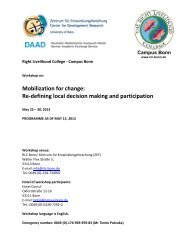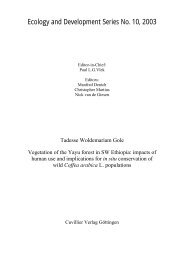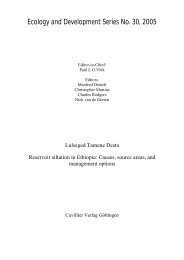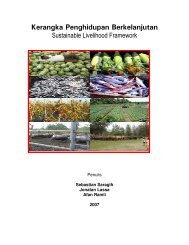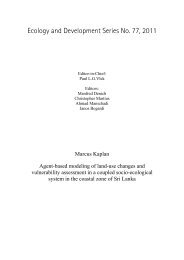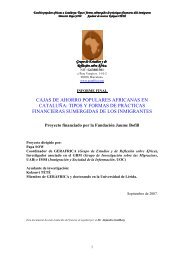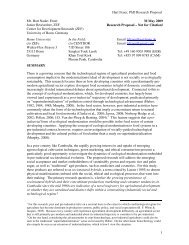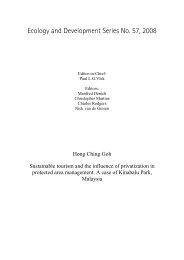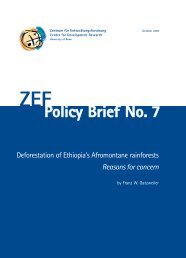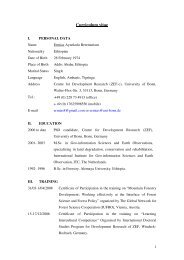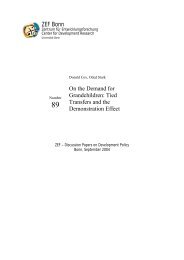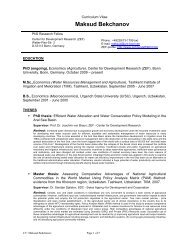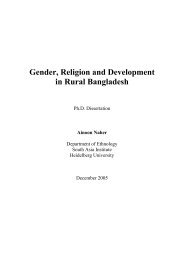Karuna Trust, Karnataka - ZEF
Karuna Trust, Karnataka - ZEF
Karuna Trust, Karnataka - ZEF
Create successful ePaper yourself
Turn your PDF publications into a flip-book with our unique Google optimized e-Paper software.
Good and Bad Practices in Microinsurance<strong>Karuna</strong> <strong>Trust</strong>, Indiathe number of days the patient is hospitalized. Doctors submit a list of drugs used to <strong>Karuna</strong><strong>Trust</strong> and get their stock refilled afterwards. As it is difficult for <strong>Karuna</strong> <strong>Trust</strong> to control thedrugs used with regard to the single patient (information asymmetry), it is possible thatdoctors use the drugs for other patients.Adverse selection. There is no direct mechanism to avoid adverse selection. However,<strong>Karuna</strong> <strong>Trust</strong> is keen on providing insurance coverage to a broad population and hopes to geta balanced mixture of good and bad risks through this. But since there is no waiting period,some clients might join when they already know that they will use the insurance; thisbehaviour is even encouraged by giving clients the possibility to join in the hospital. This riskis partly controlled by having limited enrolment periods.Fraud. It is difficult to estimate the extent of fraud in the scheme but there are a number ofloopholes where fraud is likely to occur. Where people handle money, fraud is likely to benot far behind. To receive benefits, patients need to submit the discharge summary signed bya doctor. Since doctors are aware that their signature is worth Rs. 50 ($1.10) per day ofhospitalisation, there might be a few cases where some of them charge a “processing fee”.The extent of this problem is difficult to estimate. The project coordinator is aware of thisweakness and has instructed field staff to randomly interview clients about the amountreceived and fees paid. Currently, <strong>Karuna</strong> <strong>Trust</strong> is has a strong position with the public healthproviders as Dr. Sudarshan, the Hon. Secretary of the <strong>Trust</strong>, is Vigilance Director of<strong>Karnataka</strong> and chairs the department that fights corruption.There is also the danger that the doctor and the beneficiary collaborate when the doctormakes the patient stay in hospital longer than needed (or maybe it is even not needed at all)since both could share the cash paid by the insurance.Fraud can also occur within the organisation since many people are involved in handlingmoney, like the social workers when collecting premiums and paying claims. <strong>Karuna</strong> <strong>Trust</strong>’smanagement strictly monitors and immediately acts when such a case occurs, but some casesmay remain undetected.Cost escalation. By defining a cap for benefits (max. 30 days plus surgery), cost escalation isreasonably controlled. Additionally, <strong>Karuna</strong> <strong>Trust</strong> undertakes some illness prevention byrunning a number of herbal gardens in six villages. Villagers get trained to produce herbalmedicine; currently, about 40 different syrups and powders are produced.Covariant risk. As the insurance serves a small geographic region, the scheme is vulnerableto covariant risk.4.8 Marketing<strong>Karuna</strong> <strong>Trust</strong> recognised the importance of a strong marketing mechanism as CPD’sfeasibility study revealed that the target group lacked awareness about insurance. Since theinsurance product was fully subsidised during the pilot, information about being insured andhow to utilise the benefits of the insurance was all the more important as clients might tend totake what is for free without knowing about it (which would undermine the idea of makinginsurance attractive by subsidising the first years). <strong>Karuna</strong> <strong>Trust</strong>, together with its partners34



